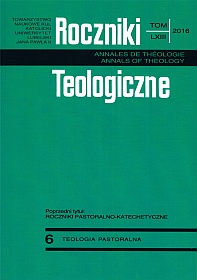Anthropology of the Constitution Gaudium et Spes in the perspective of mercy
Abstract
The inspiration of this article was 50 anniversary of the proclamation of the Constitution Gaudium et Spes by the Second Vatican Council. Re-reading of this document leads to the conclusion that the main message of theological anthropology is still important. On the other hand, social and cultural context of life and human activity, shown in the Constitution, needs be supplemented with new phenomena that fifty years ago did not exist or did not occur with such intensity, as it is currently in the societies of Western civilization. Changes concerning philosophy and lifestyle, faith and religiosity, especially changes in perception of human sexuality and the meaning of the essence of marriage and family leads to look at Vatican II’s theology of human beings from the perspective of mercy. The teaching of the popes St. John Paul II and Francis also invites us to reflect on the mystery of human being in the spirit of Christian mercy. It should be emphasized that for modern man, with the mentality of Western culture, it is much more difficult to find his way to God, than it was in previous times. One of the ways leading to God, can be proposed to modern man, is the way of mercy.
References
Coste R., Miłość, która zmienia świat. Teologia miłości, Rzym–Lublin: RW KUL 1992.
Chmielewski M., Królikowski J., Duchowość uczynków miłosierdzia. Materiały duszpasterskie na Jubileuszowy Rok Miłosierdzia (8 XII 2015 – 20 XI 2016), Skarżysko-Kamienna: Wydawnictwo Polihymnia [Lublin] 2015.
Fisichella R., Tym, co wszystko wiąże, jest miłość. Wystąpienie przewodniczącego Papieskiej Rady ds. Krzewienia Nowej Ewangelizacji, „L’Osservatore Romano” (wyd. pol.), 35(2014), nr 1, s. 57-60.
Gil Tamayo J.M., Mój sąsiad, ten ateista. Papież i kwestia Boga w dzisiejszym świecie, „L’Osservatore Romano” (wyd. pol.), 34(2013), nr 1, s. 61-62.
Góźdź K., Droga ku człowiekowi, Lublin: Wydawnictwo KUL 2011.
Góźdź K., Teologia człowieka. Z najnowszej antropologii niemieckiej, Lublin: Wydawnictwo KUL 2006.
Jagodziński M., Antropologia komunijna, Lublin: Wydawnictwo KUL 2015.
Jan Paweł II, Pamięć i tożsamość. Rozmowy na przełomie tysiącleci, Kraków: Znak 2005.
Krzemiński K., Człowiek w Duchu Świętym. Recepcja i perspektywy rozwoju soborowej antropologii pneumatologicznej, Toruń: Toruńskie Wydawnictwo Diecezjalne 2012.
Porada E., Małżeństwo we współczesnej kulturze. Koncepcja genderowa czy katolicka?, „Ateneum Kapłańskie”, 163(2014), z. 1(632), s. 77-90.
Przygoda W., Implikacje pastoralne antropologii personalistycznej, w: K. Góźdź (red.), In persona Christi. Księga na 80-lecie Księdza Profesora Czesław S. Bartnika, t. II, Lublin: Wydawnictwo KUL 2009, s. 609-617.
Weigel G., Jan Paweł II, nadzieja i współczesny sekularyzm, w: S. Nowosad, A. Eckmann, T. Adamczyk (red.), W poszukiwaniu człowieka w człowieku. Chrześcijańskie korzenie nadziei, Lublin: TN KUL 2012, s. 189-206.
Copyright (c) 2016 Roczniki Teologiczne

This work is licensed under a Creative Commons Attribution-NonCommercial-NoDerivatives 4.0 International License.





